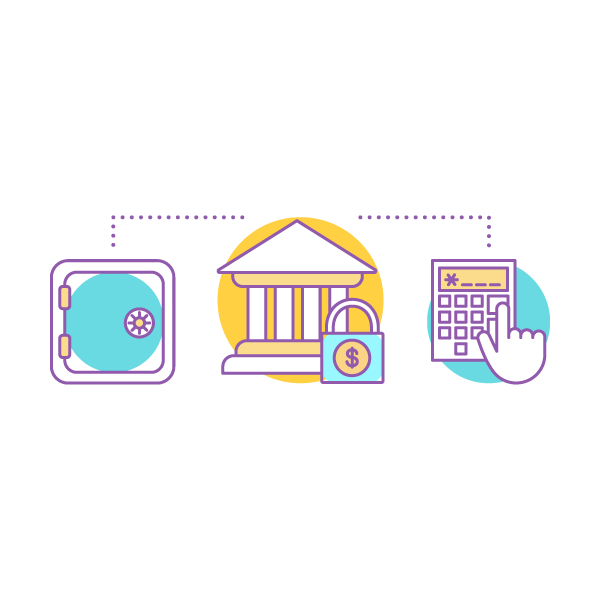- Instructor: Warren Shimada
- Course Title: Personal Finance & Stewardship
- Course Length: Two Semesters
- Type of Class: Group class through Heart Academy
- When: Fridays, 12:20-1:40 pm, Period 3
- Tuition fee payable to the teacher: $75/month
Curriculum: Students must purchase: 1) Foundations in Personal Finance for Homeschool Student Text (Grades 9-12) by Dave Ramsey, 2) Quicken Software PC version (within the last 2 years) by Intuit, 3) How to Manage Your Money: An In-Depth Bible Study on Personal Finance by Larry Burkett.
Credit Classification: The Personal Finance & Stewardship course can be titled as a “Personal Finance” or “Financial Management” full-year, high school elective.
Minimum Class Size: 4
Questions: Email Warren Shimada
Prerequisites: Most personal finance learning will be through the Dave Ramsey videos and workbook fill-ins. Basic high school reading will be helpful for some workbook pages and tests, and good pre-algebra math skills are required.
Background & Course Description:
This is a high school personal finance elective course; all class time is devoted to Personal Finance.
Personal Finance Description: Less than half of high school seniors qualify as financially literate, and more than 7 million borrowers are in default on student loans for college. Students are facing tremendous financial challenges without the basic knowledge needed to thrive in today’s economy. This is a life changing financial literacy program which teaches valuable information that students will use every day and for the rest of their lives. What a wonderful goal it would be to get out of college with NO debt and thousands of dollars in the bank.
This curriculum teaches students how to avoid debt like the plague, budget with intention, invest, and build and steward wealth. With Dave as the expert, this curriculum provides comprehensive resources. Students are facilitated in learning and bringing this curriculum to life. This class will change the financial future of students and set them on a path to win with money and change the way students look at money forever. The teaching is delivered via video by Dave Ramsey, Rachel Cruze and Chris Hogan. The students will be empowered, equipped and entertained while building confidence in their own financial decision-making.
The “Foundations in Personal Finance” is a tools based curriculum brought to life through Dave Ramsey’s humorous, engaging and entertaining personality and classroom group activities. You can view a SAMPLE VIDEO of the course featuring Dave Ramsey’s teaching by going to http://www.daveramsey.com/school/foundations-experience/
Materials to Purchase:
- Foundations of Personal Finance for Homeschool Student Text (Grades 9-12) by Dave Ramsey (can purchase at www.daveramsey.com or Amazon)
- Quicken software application (various versions between 2011-2015) (can purchase on Amazon or eBay).
- How to Manage Your Money by Larry Burkett (can purchase on Amazon or other online bookstore).
Personal Financial Curriculum Qualifications Curriculum qualifies for many State and National literacy standards. Go to http://www.daveramsey.com/school/foundations/ and scroll to middle of page to download the standards for this curriculum.
Who can attend? High school students (9-12th grade) who have the reading, math and maturity for these concepts. The students with a source of income get the most understanding and knowledge from the class. If the student does not have a job, the instructor suggests giving child money to manage with a written budget. Parents are invited to come and learn together
Class Overview
- Personal Finance topics covered in class by watching DVD video lessons by Dave Ramsey’s “Foundations in Personal Finance”. The student workbook provides notes, chapter summaries, review material and tests. See description under “Personal Finance Topics Covered” below.
- Learn how to use Quicken software application (PC version) by Intuit to create budgets, manage checking/saving/credit card accounts, manage investment portfolios and create reports. Each student will be taught how to input data into their personal accounts for appropriate record keeping and tracking their income/expenses and assets/liabilities. Also, students will create budgets, manage investments and create reports.
- Learn how to create income by selling items on eBay and Craigslist. Each student will learn who to create personal income by selling new/used items on eBay and/or Craigslist. —
- In class, group activities will focus on life applications and decision making based on various personal finance scenarios. These “real life” scenarios will allow each student to apply what they are learning from the Dave Ramsey videos.
- Learn and study what the Bible says about personal finance decisions on savings, investing, retirement, credit, etc. The class will discuss these topics in small groups based on Larry Burkett’s bible study: How to Manage Your Money. See below for bible study topics under “Biblical Topics Covered”.
Workload
- Class Each week, we will watch 1-2 DVD videos (15 minutes each) featuring Dave Ramsey as the speaker. Students will fill in the blanks in their workbooks during the video teaching. At the end of the video, I will review the answers in the workbook and discuss in more detail the topics covered in the video. After the completion of each chapter, we will review and discuss the Chapter Summary material before giving a Chapter Test in class. Chapter Tests will be given in class. In each chapter, we will do 1-2 group activities in class to emphasize life application of topic being studied.
- Homework assignments will be given weekly out of the student workbook. There is some light reading and writing which should be about 2-3 hours per week. Students will be expected to complete assignments each week so the material can be reviewed and discussed in class.
Grading and Assessment: Grading will be providing each student a class grade. The final grade is determined by the parents. If at anytime, there is a question, please let me know.
Tests = 65%
Homework = 20%
Class Participation = 15%
Personal Finance Topics Covered You can see sample videos, download sample chapter material and download a sample test at: http://www.daveramsey.com/school/foundations-experience/ Visit Dave Ramsey’s website for more information about this class at: http://www.daveramsey.com/school/foundations-home-school/?snid=classes.homeschools
Unit 1: Saving and Budgeting
- Chapter 1. Introduction to Personal Finance Introduces the topic of personal finance, explores the evolution of the American credit industry, and highlights the importance of both knowledge and behavior when it comes to managing money.
- Chapter 2. Saving Emphasizes the importance of saving and explains the three reasons to save: emergencies, large purchases, and wealth building.
- Chapter 3. Budgeting Explores the purpose and process of writing a budget and the basics of banking, including balancing and reconciling a checking account.
Unit 2: Credit and Debt
- Chapter 4. Debt Identifies the devastating costs of using debt as a financial tool, debunks credit myths, explains the elements of a credit score, identifies organizations that maintain consumer credit records, and summarizes major consumer credit laws.
- Chapter 5. Life after High School Explores 21st Century post-secondary education and career options, highlights the importance of avoiding debt as a young adult, and explains how to cash flow a college education.
- Chapter 6. Consumer Awareness Identifies factors that influence consumer behavior and the effect of inflation on buying power.
Unit 3: Financial Planning and Insurance
- Chapter 7. Bargain Shopping Highlights the importance of bargain shopping as part of a healthy financial plan and identifies important negotiation strategies.
- Chapter 8. Investing and Retirement Establishes basic investing guidelines, describes and compares various types of investments, and identifies elements of employer benefits and retirement plans.
- Chapter 9. Insurance Identifies the purpose of financial risk management as well as the appropriate and most cost-effective risk management strategies. Unit 4: Income, Taxes, and Giving
- Chapter 10. Money and Relationships Identifies the differences among people’s values and attitudes as they relate to money and highlights communication strategies for discussing financial issues.
- Chapter 11. Careers and Taxes Examines the importance of pursuing a career in line with your strengths, the elements of effective goal setting, the best practices of successful people, and types of income and taxes.
- Chapter 12. Giving Highlights the importance of giving of your time, talents, and money in order to serve others and leave a lasting legacy.
Biblical Topics Relating to Personal Finance Covered in ”How to Manage Your Money” by Larry Burkett
- What is Wealth?
- God’s Will in Finances
- The Perils of Money
- Release from Servitude
- Financial Planning God’s Way
- Motives for Accumulating Wealth
- How Much is Enough?
- Sharing by God’s Plan
- Deciding Who Deserves Help
- Making Financial Decisions God’s Way
- The Challenge
My role as the facilitator of the class:
- To involve students, after each video section, in the review and discussion of the questions in the workbook.
- To involve students, at the end of each chapter, to review and discuss the Chapter Summary, Take Action Challenge and the Money Review .
- To help students gather in groups to participate in group activities involving real life money situations and decisions.
- To provide a chapter test and grade the students test after completion.
Bring to class every day:
- Foundations in Personal Finance Workbook
- Binder (1.5-2-inch, 3-ring binder) with blank notepaper
- Pencils, pens, erasers, color highlighters
Contacting the Teacher: The best way to contact me is by email.




